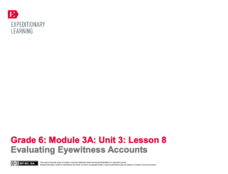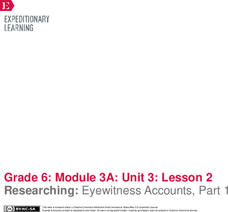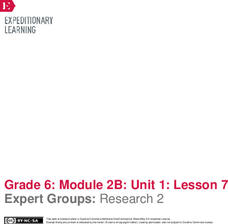EngageNY
Forming a Research-Based Claim: Creating Stakeholders Charts
Present the facts. Scholars create presentations of their research on DDT using their Cascading Consequences chart and a
Stakeholders Impacts chart as visuals. They discuss the term stakeholders and create a Stakeholders Impacts chart...
EngageNY
Researching Information about Overfishing
Imagine a world without Nemo and Dory. Using the resource, pupils engage in a jigsaw activity, working in triads to research information about overfishing. They watch a video about overfishing, complete a graphic organizer, read relevant...
EngageNY
Researching Information about Sustainable Fishing
Go fish! Scholars continue using their research skills to find factual information to use in their consumer brochures about overfishing. They work in triads to research information about sustainable fishing practices and share their...
EngageNY
End of Unit 3 Assessment: Drafting the Newspaper Article
Choose your words carefully. Scholars continue looking at the creation of a newspaper article by examining word choice. They highlight key verbs, vocabulary, and descriptive words in the model article Sandy wreaks havoc across
Northeast;...
EngageNY
Researching: Eyewitness Accounts, Part 2
Continue on. Learners continue with the work they began in the last lesson looking for quotes to complete an eye witness interview. Pupils work in their groups to examine the texts in their research folders and The Great Earthquake and...
EngageNY
Performance Task: Final Draft of the Newspaper Article
It's time for the grand finale! Scholars complete the final draft of their newspaper articles for the End of Unit 3 Assessment. They share their article with a classmate for peer critique. After considering all feedback and including a...
EngageNY
Revising the Newspaper Article: Sentence Structure and Transitions
Take two. After a mini lesson covering sentence structure and transition words, scholars revise their End of Unit 3 Assessment based on feedback. Writers self-score their assessments against row three in the Newspaper Article Rubric.
EngageNY
Organizing Research: The Inverted Pyramid
Bottom side up! Scholars complete an Inverted Pyramid handout to gain a better idea of how journalists organize information. They then look at the organization of a model newspaper article and gain ideas about creating their own...
EngageNY
Evaluating Eyewitness Accounts
That sounds like a plan! Scholars complete the Newspaper Article Planning graphic organizer to understand the process of writing a newspaper article. They also use what they learned about researching factual information and gathering...
EngageNY
Analyzing the Features of a Newspaper Article
There's more to newspaper articles than meets the eye. Scholars learn the different features of a newspaper article, including headline, byline, subheadings, etc. Pupils circle the features in an article as the teacher discusses their...
EngageNY
The Five W’s
Let's take the big W. Scholars analyze the model newspaper article Sandy wreaks havoc across Northeast; at
least 11 dead and look to answer who, what, when, where, and why. They work in groups of three to complete a Five W’s web...
EngageNY
Mid-Unit 3 Assessment Part 1: Researching the Destruction Caused by the 1906 San Francisco Earthquake and Fires
How do you interpret that? Scholars work on their mid-unit assessments by interpreting resources pertaining to the 1906 San
Francisco Earthquake and Fires. Readers use the text in their research folders and complete graphic organizers,...
EngageNY
Researching: Eyewitness Accounts, Part 1
Time to go on a quote hunt! Because learners cannot interview real eye witnesses for their newspaper articles, they read through text The Great Earthquake and Fires of 1906 looking for quotes to answer their questions. Learners complete...
EngageNY
Researching Facts
How did the 1906 San Francisco earthquake and fire affect the city's inhabitants? Scholars embark on a quest to discover the answer as they work in small groups to research articles about the event. They finish by completing a jigsaw...
EngageNY
Mid-Unit 3 Assessment Part 2: Explaining How New Information Connects to the Topic
Take two! Scholars begin part two of the Mid-Unit 3 Assessment. They continue researching the destruction caused by the 1906
San Francisco earthquake and fires. To further their research, they discuss how new information connects to the...
EngageNY
Mid-Unit 3 Assessments, Part 2: Summarizing, Analyzing and Discussing Research
Why is reading important? As part of the mid-unit assessment, scholars read, summarize, and analyze an article about the importance of reading. Additionally, they continue their discussion about whether their rules to live by should be a...
EngageNY
Mid-Unit Assessment: Research
Middle assessment for the Middle Ages. Scholars complete a mid-unit assessment by reading and answering questions about three different text pertaining to the Middle Ages. Learners work independently on the assessment for the class period.
EngageNY
Expert Groups: Research 1
Be a team player. Scholars gather in their expert groups and discuss group norms and roles. They look at their research topics and determine how they will divide the work among themselves. Groups look over their research folders and ask...
EngageNY
Mid-Unit 3 Assessments, Part 1: Summarizing, Analyzing and Discussing Research
Speak up and listen up. Scholars participate in a speaking and listening mid-unit oral assessment. They discuss whether their rules to live by should be a personal choice or made into a law, and then they complete an exit ticket to...
EngageNY
Researching Part 2: Reading for Gist and Gathering Evidence Using the Researcher’s Notebook
The gist should be short and sweet! Pupils practice finding the gist of an informational text and then write a summary of the text. Next, they gather with their research teams to discuss a focus question based on the novel Bud, Not Buddy...
EngageNY
Expert Groups: Research 2
Continue on. Scholars continue the research they began in their expert groups in lesson six. They read text and task cards from their research folders and share what they have gathered in research thus far. Individuals then spend the...
EngageNY
Forming a Research-Based Claim: Stakeholder Chart on Better Agricultural Water Management
How can industries manage water more sustainably? Building on the previous activity, scholars explore the topic by creating a stakeholder chart for agricultural water management. Next, they participate in the World Café discussion...
EngageNY
Forming a Research-Based Claim: Stakeholder Chart on Better Industrial Water Management
It's time to stake a claim! Working with partners, scholars create stakeholder charts for better industrial management of water. As they complete the chart, pupils consider an option for managing water more sustainably, identify...
EngageNY
Forming a Research-Based Claim: Cascading Consequences Charts
Life is all about choices and consequences. Using a Cascading Consequences chart, scholars create a visual map of the effects of a particular choice or action related to water management. With their researcher's notebooks and copies of...

























